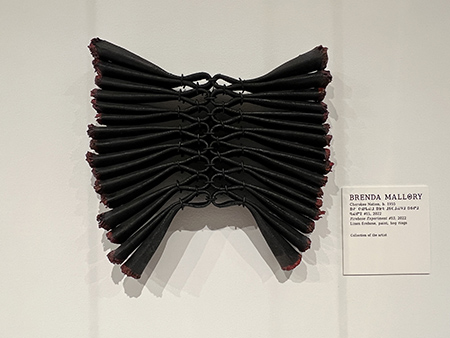
Continuing through February 5, 2024
It isn’t readily apparent at first that Brenda Mallory, a member of the Cherokee Nation born in Oklahoma and based in Oregon, has created her myriad forms, patterns, textures, and connections primarily with unconventional materials. Mallory’s inventory includes bisected thread spools, hog rings, cardboard packing materials, fire hoses, nuts and bolts, and automotive drive belts. She has a wondrous facility for repurposing found and reclaimed items, which become both objects of art and tools for artmaking in her creative practice.
For “Demeter Does the Math (and Cries)” (2000), Mallory created thirteen parallel lines using waxed cloth, shell casings, thread, and wood. For “Zen Scrubber #2” (2015), she deconstructed linen fire hoses so strips of fabric emerge from a wall-mounted circular scrubber pad, much as a horse’s tail flows from its body. In every case, she works with a limited palette of black, white, red, and gold, often juxtaposing hard and soft materials that call to mind both organic forms and post-industrial waste. Often the artist assembles bits and pieces of fabric, such as the cast-offs of cotton menstrual pads, into bricolage assemblages that challenge binary perceptions of craft and fine art. Although it is a strategy long practiced in feminist art, the exhibition does not position these works as a form of feminist critique.
Materiality is Mallory’s muse, as revealed in the approximately two dozen works selected from a two-decade career in which she’s also worked in ceramics and glass. “North Star (To Lead)” (2022) is composed of a square cross within a square form made with a honeycomb packing sheet, paint, and encaustic. The exhibition’s title itself, “The North Star Changes,” hints at both the conceptual and physical threads that course like a pulsing, winding river through this body of work.
The exhibition title references the misconception that the North Star is a fixed entity while elevating the idea that the cosmos is ever-changing. If materiality feeds Mallory’s creative impulse, the work as presented amounts to a reflection on the fluidity of time, space, and existence. The approach is particularly poignant within the wider context of the museum’s “Substance of Stars,” a permanent exhibition opened in late 2022 that considers the sky knowledge and origin stories of four Indigenous peoples.
With Mallory’s works here we encounter both the grand scale of cosmology and the specificity of the artist’s — and our own — particular (albeit shifting) place within it. Her installations and sculptures, including abstractions made with materials sourced from a city dump, are imbued with multiple meanings informed by the original uses for the materials, the artist’s biography, and historical and contemporary social, cultural, and political landscapes.
The fire hoses used in “Firehose Experiment #16” (2022), for example, prompt association with their use to quell protests. The tall, dark totems paired with starburst forms in “Recurring Chapters in the Book of Inevitable Outcomes” (2015), allude to both the destruction caused by wildfires and our capacity to survive, adapt, and heal. Hog rings used in “Consensual Attachments: Across Time and Space” (2022) signal debates about animal cruelty in modern agribusiness practices. Honeycomb patterns, most prevalent in “biophilia: Emergent Properties” (2005), reference the artist’s memories of time spent with her beekeeping grandfather. In the white, circular ceramic piece “Precession” (2022), and the small wall sculpture “biophilia: Cradle” (2005),” we also see echoes of Indigenous basketry and weaving traditions.
A half century ago, feminist strategies included asserting the validity of female experience and perspective in part through the symbolism of domestic objects. Today, Mallory is part of a generation that has expanded our aesthetic vocabulary such that materials associated with that history are injected into art’s mainstream. “The North Star Changes” is an exquisite ode to connections and transformation — of ideas, cultures, nature, community, family, and self.
